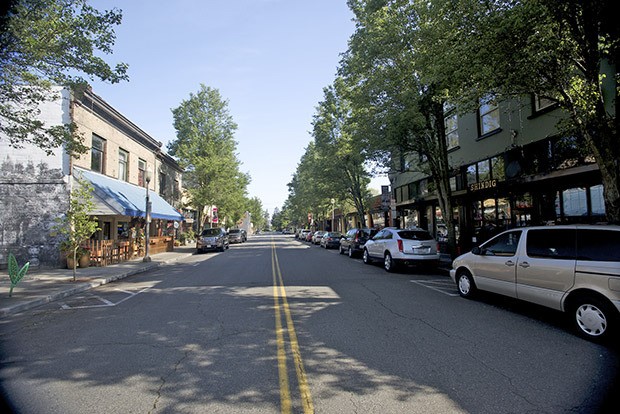It’s 6 in the evening on a Thursday, and Kent’s First Avenue is almost deserted. Occasional visitors stop at the Shindig Martini Bar or Spiro’s Greek Island, but by and large the businesses are empty.
“It’s a ghost town by 8 o’clock,” said Dave Bishart, owner of the Shindig Martini Bar, as the 6:30 p.m. Sounder line rumbles by. The train’s horn blares into the bar through an open back door.
Bishart’s bar, painted a sleek and subtle black with a two floors, carries an aesthetic of a 1940s lounge.
Six years ago when Shindig opened, Bishart envisioned an after-hours hangout that could serve delicious custom martinis available nowhere else in the area.
But business has soured on First Avenue, and local and state taxes do little to help struggling store owners keep their doors open. The litany of taxes includes those for Medicaid and insurance.
A liquor license alone costs $2,500 each year. It’s compounded with business and other permits and property taxes. Everything from Bishart’s fixtures to his seating is taxed.
“I have to pay a tax each year on every chair in the bar,” Bishart said.
High overhead costs, due in no small part to tax rates and liquor costs, diminish Bishart’s liquor selection.
The bar originally sported a three-page menu of custom cocktails, which Bishart claims aren’t available anywhere else. That menu is now down to a single page of eight drinks.
There used to be a sense of “support local,” said Bishart, but he feels that support has shifted to Kent Station and the ShoWare Center.
Since Kent Station’s construction eight years ago, First Avenue has struggled to find an identity and customer base in the rapidly changing environment of South King County and Kent. The introduction of the complexes adjusted traffic flow away from Meeker Street and redirected it along Smith and James streets, depriving the First Avenue block of valuable traffic and stopovers.
Part of the problem, Bishart said, is First Avenue’s location. Another small step forward would be the city providing more investment on First Avenue, such as bright streetlights and beautification.
The first step, Bishart said, is to have the community more engaged and aware of the resources outside of Kent Station.
“People think that that’s the downtown area,” Bishart said, “unless they’ve lived here forever.”
Sharon Roberts, who manages Spiro’s Greek Island, said that the area has attracted a reputation as being rundown and dangerous, but that isn’t entirely true. While there was a problem with homeless vagrants in the past, city police recently cleaned the area up and moved them along. Roberts said that while she wouldn’t walk down First Avenue alone at night, she also doesn’t think it’s more severe than any other part of downtown.
Roberts moved to the area seven years ago and said that First Avenue was much different then.
“When I first came here this was a party street,” she said.
Development around the Norm Maleng Regional Justice Center has progressively siphoned those customers away, and the broken nature of First Avenue – the Kent Library obstructs the street halfway down – diminishes through traffic.Bishart is content to pay the taxes, but worries about how much longer he’ll be able to keep his doors open without fresh faces on First Avenue.
Talk to us
Please share your story tips by emailing editor@kentreporter.com.
To share your opinion for publication, submit a letter through our website https://www.kentreporter.com/submit-letter/. Include your name, address and daytime phone number. (We’ll only publish your name and hometown.) Please keep letters to 300 words or less.

